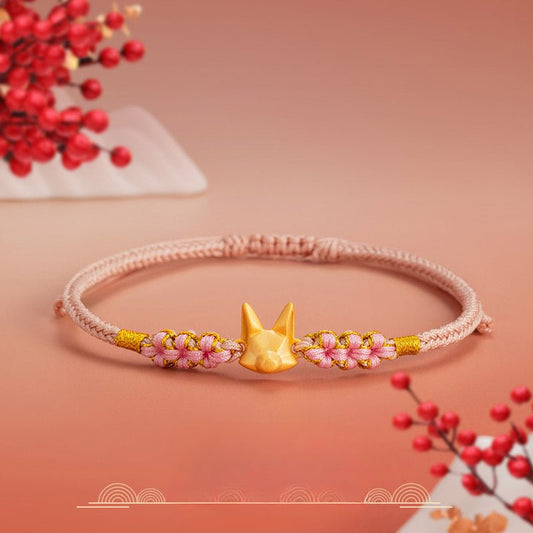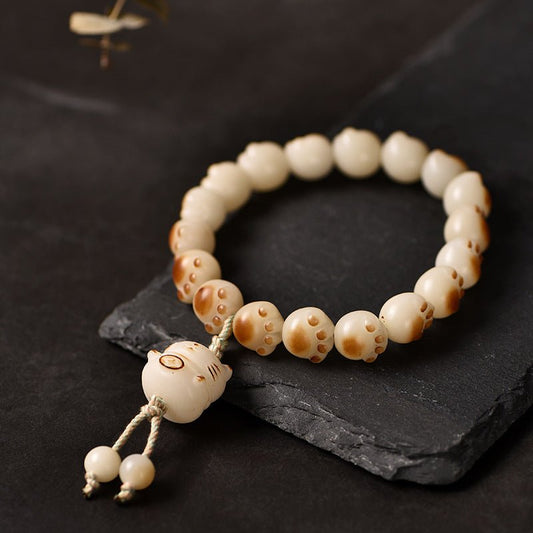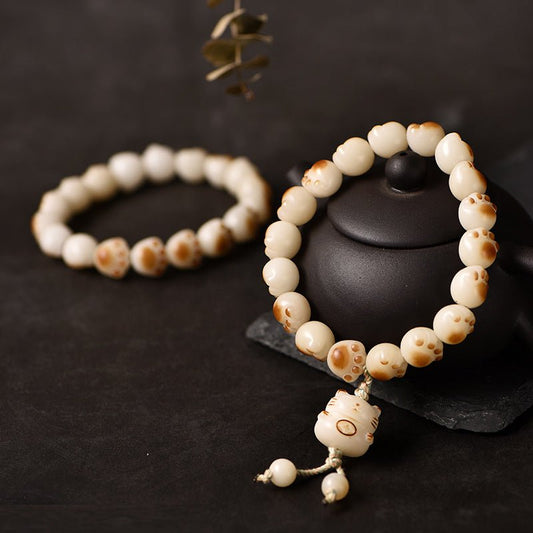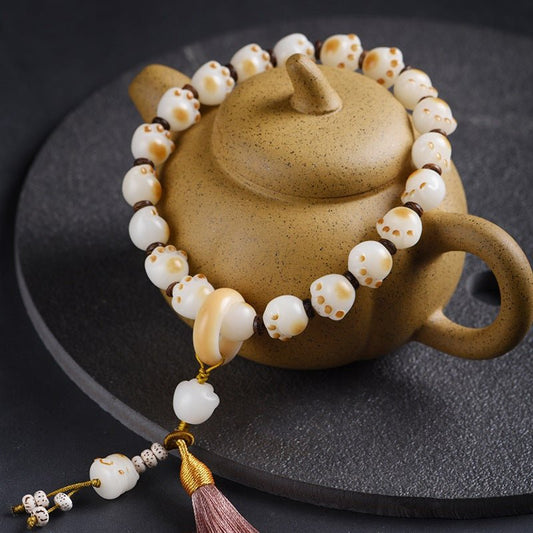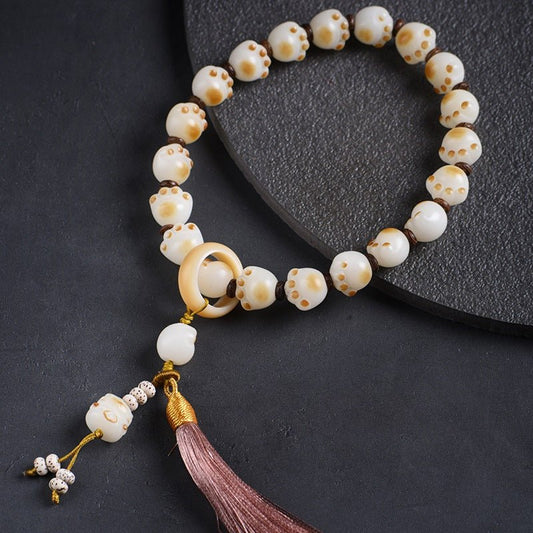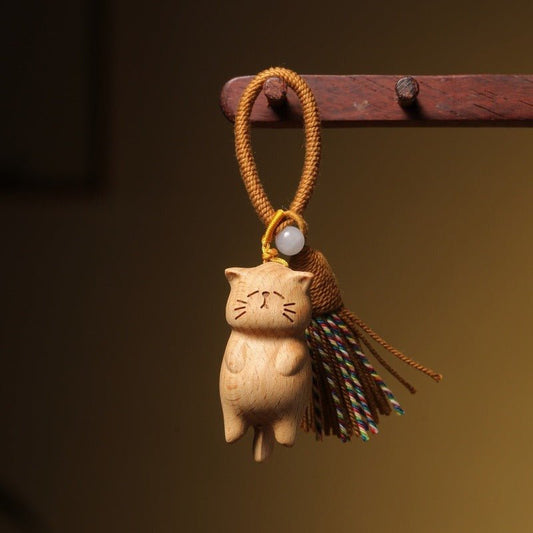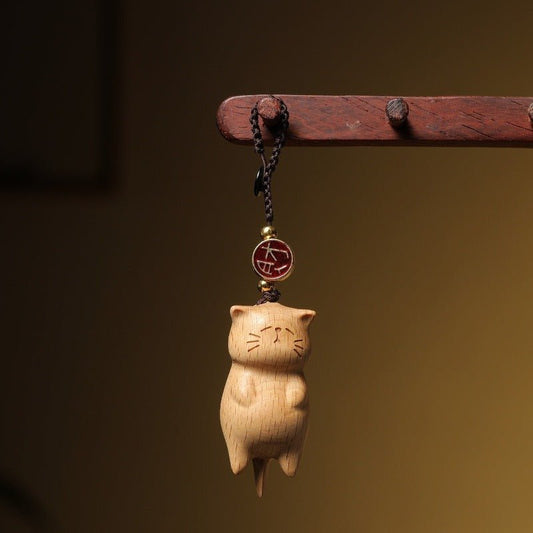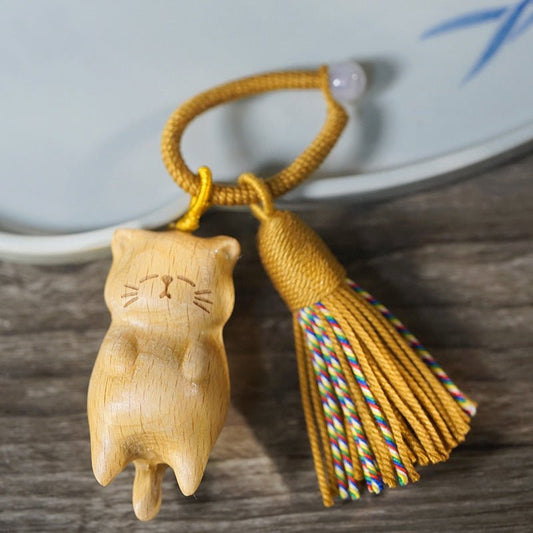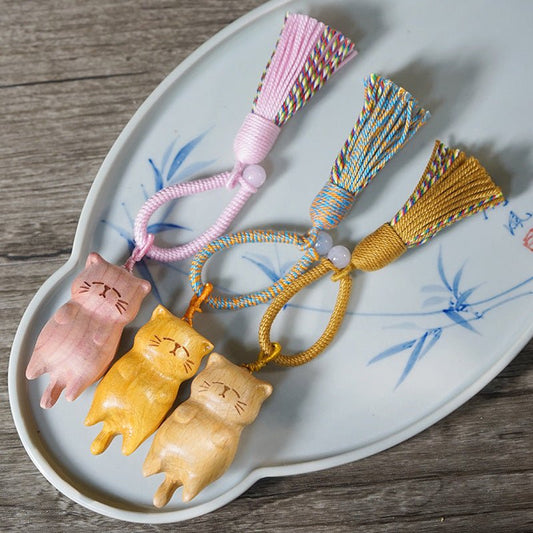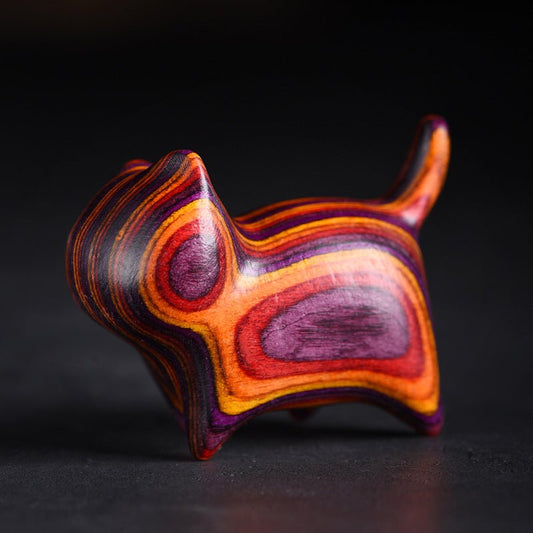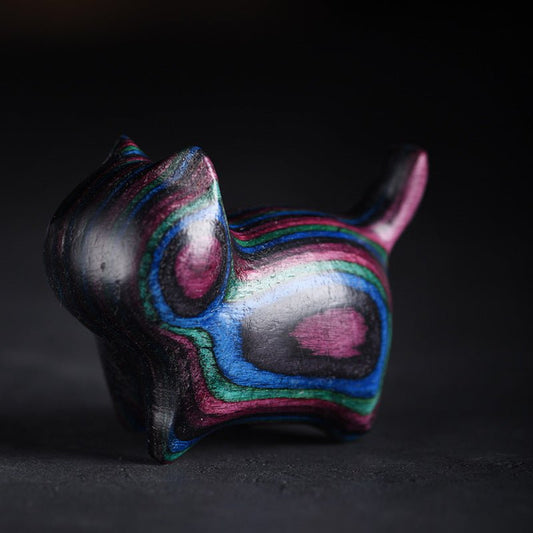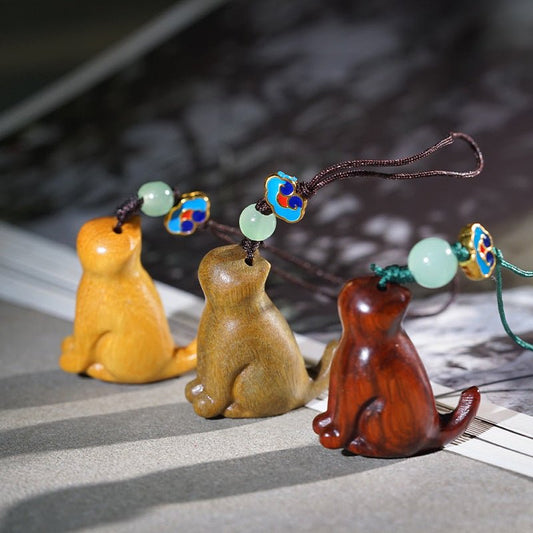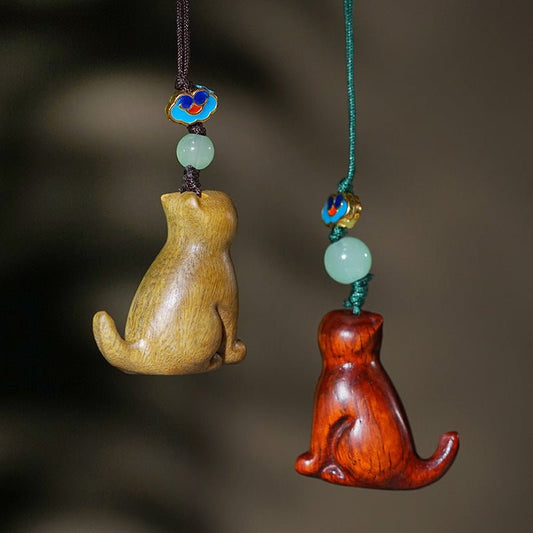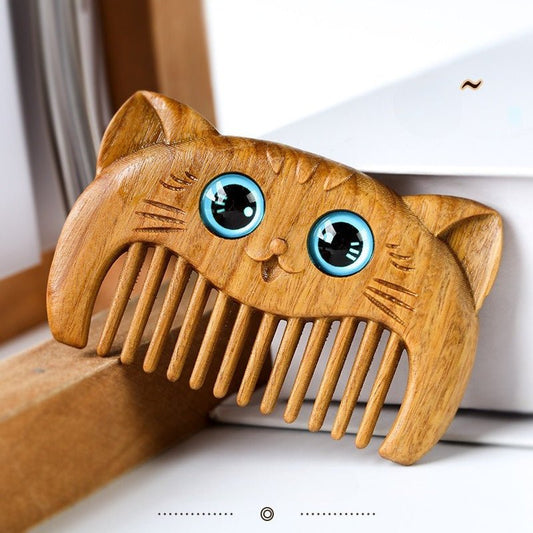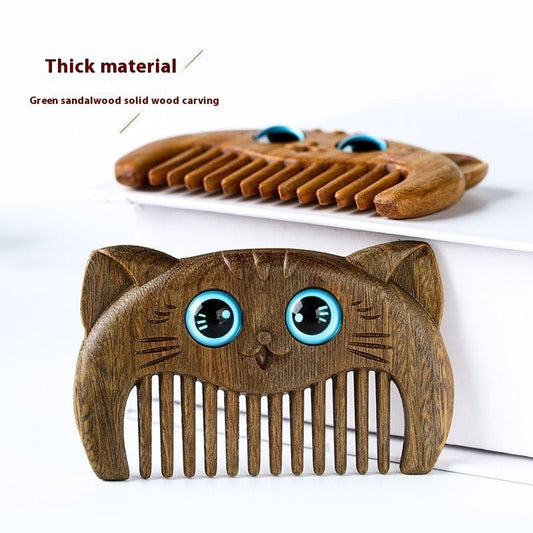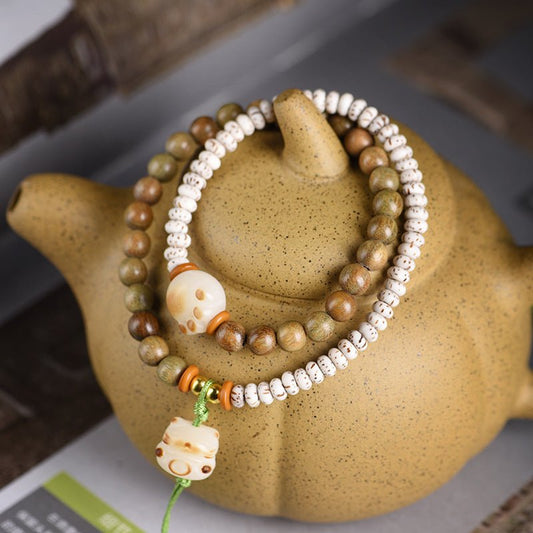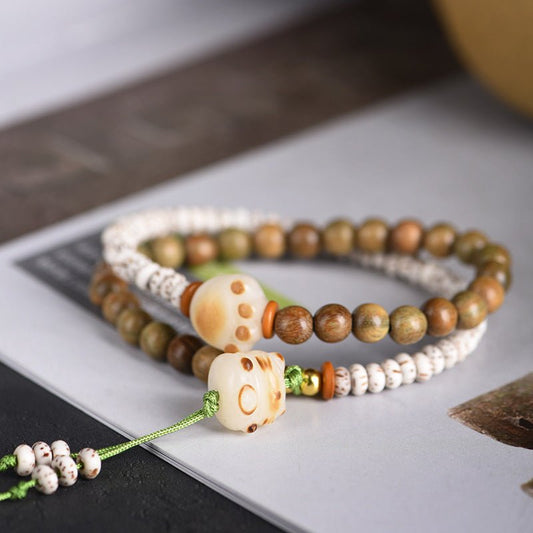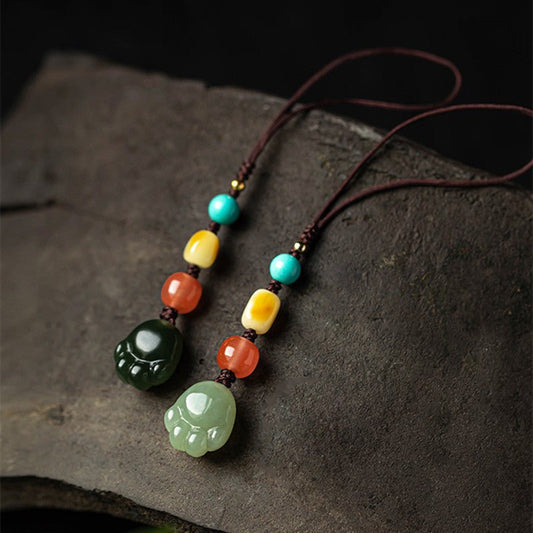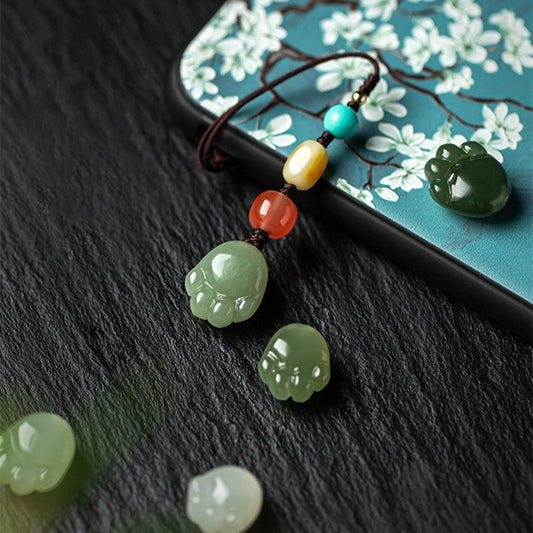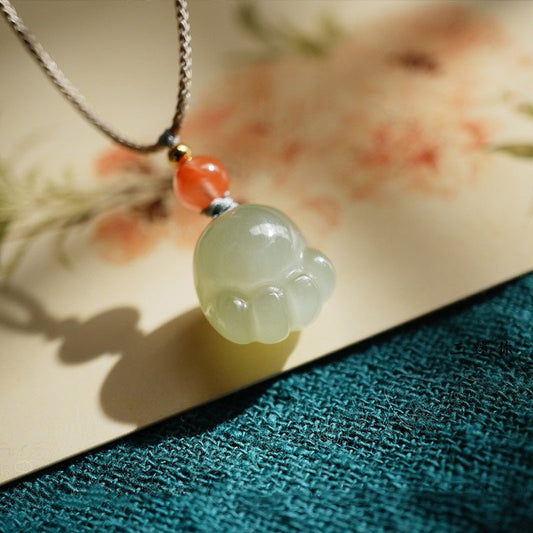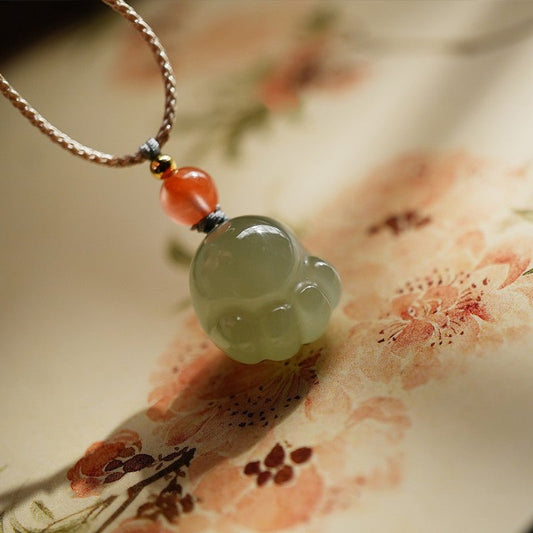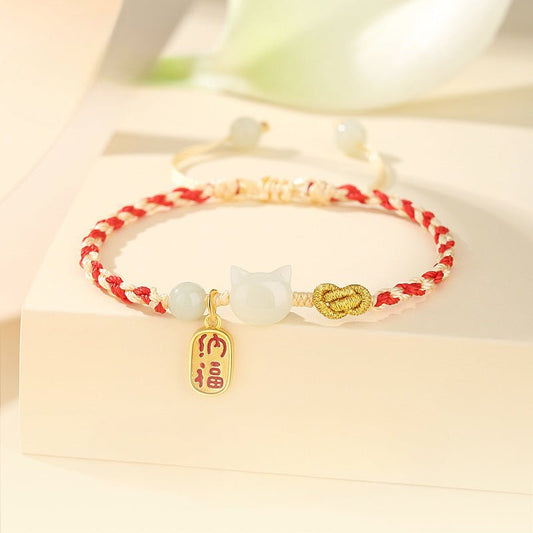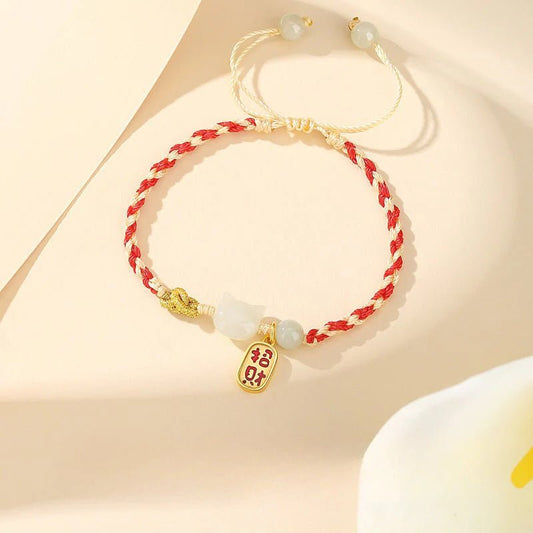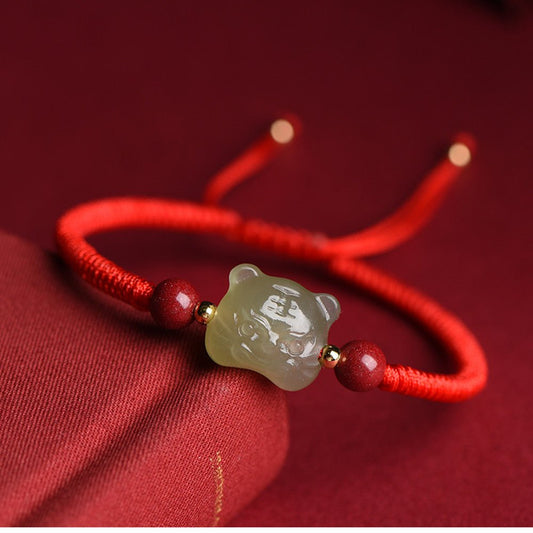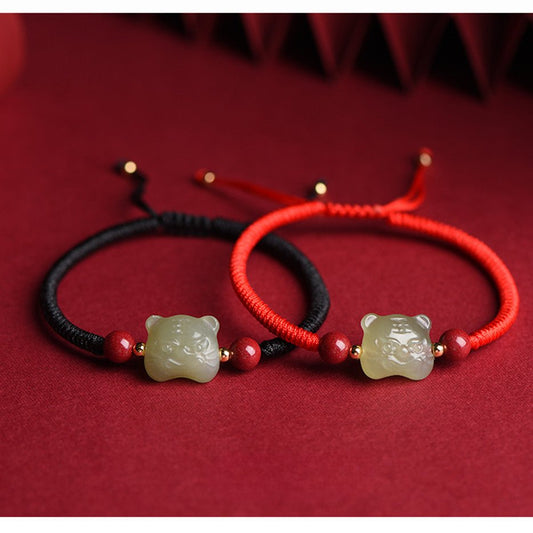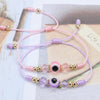-
Charcoal-Burned Cat Paw Bodhi Root Bracelet with White Jade Bodhi Beads
Regular price $18.88save: 46% Sale price $18.88Unit price / perThis Charcoal-Burned Cat Paw Bodhi Root Bracelet is a charming, spiritual accessory that combines the best of traditional craftsmanship with a playful twist. The white jade Bodhi beads are naturally beautiful and known for their meditation-enhancing properties, making it perfect for mindfulness and relaxation. 🌟✨
Key Features:
-
Charcoal-Burned Bodhi Root Beads: Each bead is carefully charcoal-burned for a unique finish, creating a warm, rustic aesthetic.
-
Cat Paw Design: The bracelet features playful cat paw shapes that bring positive energy and symbolize good fortune, prosperity, and protection. 🐱
-
White Jade Bodhi Seeds: These smooth, calming beads are known for their connection to spiritual growth, offering a peaceful presence.
-
Ideal for Meditation & Relaxation: The design and materials promote focus and mindfulness, making it ideal for meditation practice, prayer, or simply wearing as an accessory for positive energy.
-
Durable and Comfortable: Made with sturdy, flexible cord for comfortable wear and easy use. Its lightweight feel ensures comfort throughout the day.
Product Parameters:
-
Bead Material: Charcoal-burned Bodhi root, White jade Bodhi beads
-
Bracelet Length: Adjustable, suitable for most wrist sizes
-
Cat Paw Pendant: Unique, symbolic charm for added spiritual significance
-
Weight: Light and comfortable for long wear
-
Color: Neutral earthy tones with white jade accents
-
Occasions: Perfect for meditation, daily wear, gifting, or spiritual practices
Product Care & Considerations:
-
Keep Dry: Avoid exposing the bracelet to water or moisture to maintain the integrity of the beads and cord.
-
Avoid Harsh Chemicals: Clean your bracelet using a dry cloth and avoid harsh chemicals that could damage the natural materials.
-
Handle with Care: While the bracelet is durable, it’s best to avoid impact or rough handling to preserve its shape and finish.
-
Storage: Keep it in a cool, dry place to avoid direct sunlight and preserve the beads’ quality over time.
Why Choose This Bracelet?
This Charcoal-Burned Cat Paw Bodhi Root Bracelet is not just a beautiful accessory; it’s a spiritual tool that supports mental clarity and inner peace. The unique cat paw design adds a playful element, while the use of natural materials ensures a truly organic, mindful experience. Whether used for meditation, as a daily accessory, or a gift for someone special, this bracelet offers both style and spiritual benefits. 🌸✨
Sale -
-
Charcoal-Burned Cat Paw Bodhi Beads Bracelet
Regular price $18.88save: 55% Sale price $18.88 Regular priceUnit price / per$42.25Discover the charm and spiritual significance of this Charcoal-Burned Cat Paw Bodhi Beads Bracelet. Each bead is meticulously crafted from high-quality Bodhi roots, offering a unique tactile experience while providing spiritual and meditative benefits. This bracelet is not only a beautiful accessory but also a powerful tool for mindfulness and reflection. 🧘♀️🧘♂️
Key Features:
-
Premium Material: Crafted from natural Bodhi root beads, carefully charred to perfection to reveal a rich, warm texture.
-
Elegant Design: Features cat paw-shaped beads, symbolizing luck and protection, combined with the purity of white jade Bodhi seeds for a sophisticated look.
-
Spiritual Significance: Each bead is known for its connection to meditation, promoting mental clarity and emotional balance.
-
Durable and Comfortable: Made with sturdy cord to ensure long-lasting wearability while maintaining comfort on your wrist.
Product Parameters:
-
Bead Material: Bodhi root, White Jade Bodhi seeds
-
Bracelet Length: Adjustable, fits most wrist sizes
-
Weight: Light and easy to wear
-
Color: Light brown and white tones with unique burn marks
-
Decoration: Features a beautiful tassel and small decorative beads
-
Occasion: Perfect for daily wear, meditation, and spiritual practices.
Product Care & Considerations:
-
Avoid water exposure: Keep the bracelet away from excessive moisture to maintain its pristine look.
-
Store in a cool, dry place: Avoid direct sunlight or heat sources to prevent damage to the natural materials.
-
Handle with care: Although the materials are durable, it’s best to remove the bracelet during activities that could cause unnecessary friction or impact.
-
Personal touch: Over time, the beads may develop a unique patina, adding character to your bracelet.
Why Choose This Bracelet?
This Cat Paw Bodhi Beads Handheld Bracelet is perfect for anyone seeking a blend of traditional craftsmanship and modern style. It’s not just an accessory, but a tool for meditation, self-reflection, and positive energy. Whether you're using it as a meditative bracelet or as a symbol of good luck, it’s a perfect addition to your spiritual journey. 🌸
With its calming design and meaningful symbolism, this bracelet is a great choice for enhancing your daily practice or as a thoughtful gift for someone special. 🌟
Sale -
-
Creative Wooden Beech Cat Keychain – Cute Hand-Carved Cat Keychain Pendant for Bags
Regular price $13.88save: 48% Sale price $13.88 Regular priceUnit price / per$26.88Meet our playful and adorable Beech Wooden Cat Keychain 🐱 – a delightful accessory to add personality to your bags or keys. This hand-carved cat pendant is made from high-quality beech wood, ensuring both durability and eco-friendliness 🌳. The cute little cat, with its gentle whiskers and joyful pose, is a perfect charm for any cat lover or anyone who enjoys cute, unique accessories.
The Wooden Cat Keychain is designed to be lightweight yet sturdy. The soft, natural tones of the wood complement any style, making it the perfect gift for friends, family, or even yourself. Plus, the charming tassel adds a fun, colorful touch that will brighten your day. 🎨
Whether you're using it as a keychain, bag accessory, or decoration, this wooden cat charm brings warmth and joy wherever it goes. 😻💫
Key Features:
-
Material: Premium beech wood for long-lasting use 🌿
-
Size: Perfectly sized for easy carrying and hanging
-
Hand-Carved Detail: Each piece is uniquely crafted with care
-
Cute Design: Adorable cat figure with a relaxing expression
-
Versatile Use: Great as a keychain, bag accessory, or a gift 🎁
Important Notes:
-
Care: Keep your keychain dry and avoid direct sunlight to maintain its beauty
-
Dimensions: Approximately 3.5 x 6 cm for a compact and lightweight feel
-
Handmade Nature: Slight variations in design may occur, ensuring each keychain is one-of-a-kind
Elevate your accessories game with this whimsical wooden cat keychain! 🐾💖
Sale -
-
Hand-Carved Lazy Cat Keychain – Beech Wood, Golden Sandalwood & Blood Pinewood with Tassel
Regular price $13.88save: 53% Sale price $13.88 Regular priceUnit price / per$29.99Add a touch of charm to your everyday accessories with our Lazy Cat Keychain. Expertly hand-carved from Beech Wood, Golden Sandalwood, and Blood Pinewood, this keychain features an adorable lazy cat design, making it a fun and unique accessory for cat lovers. Perfect as a keyring or a decorative charm, it also makes a great gift for anyone who appreciates fine craftsmanship and whimsical design. 🌿🎉
Key Features:
-
Material: Made with high-quality Beech Wood, Golden Sandalwood, and Blood Pinewood for a smooth, natural finish.
-
Design: A cute lazy cat carved with intricate details, including whiskers and paws, bringing warmth and personality to your keychain.
-
Handmade: Each keychain is carefully carved by artisans, making every piece unique.
-
Tassel: Features a colorful tassel, adding a vibrant and playful element to the design.
-
Multi-purpose: Perfect for attaching to your keys, bags, or backpacks. Can also be used as a charm for your purse or car mirror.
-
Size: 5.52.52.5 cm – Small and compact, perfect for everyday use. 📏
Product Specifications:
-
Dimensions: 5.52.52.5 cm (approx.)
-
Materials: Beech Wood, Golden Sandalwood, Blood Pinewood
-
Tassel: Multi-colored, hand-woven for durability and style.
-
Weight: Lightweight, easy to carry around.
-
Color: Available in natural wood tones with a colorful tassel.
Perfect For:
-
Gift Idea: A thoughtful gift for cat lovers, friends, or family. Great for birthdays, holidays, or any special occasion. 🎁
-
Keychain Lovers: A must-have accessory for anyone who loves unique and artistic keychains.
-
Home Decor: Use it as a cute charm for your bag, purse, or car mirror to brighten up your space.
Important Notes:
-
Care Instructions: Keep your wooden keychain dry. Avoid excessive water exposure and moisture to maintain its durability and finish.
-
Handling: Due to the natural materials used, slight variations in color and grain may occur, ensuring each piece is one of a kind.
-
Cleaning: Wipe with a soft cloth to preserve the integrity of the wood and the tassel.
Sale -
-
Rainbow Wood No-Face Cat Desktop Figurine – Colorful Handcrafted Cat Gift for Cat Lovers
Regular price $8.88save: 47% Sale price $8.88 Regular priceUnit price / per$17.00Bring home a touch of whimsical charm with our Rainbow Wood No-Face Cat figurine, perfect for your desk or home décor. Crafted from vibrant rainbow wood, this adorable, creative cat figurine features an intriguing no-face design that makes it an ideal gift for cat lovers and anyone who enjoys quirky, creative pieces. With its healing vibes, this figurine adds a calming, positive energy to any space. 💖🌈
Key Features:
-
Material: Made from Rainbow Wood, offering a multi-colored, vibrant look that is both unique and eye-catching.
-
Design: A charming no-face cat with smooth curves and artistic colors, creating a sense of creativity and tranquility. 🐱✨
-
Size: 4.7 x 2.2 x 3.5 cm – Perfect size for displaying on your desk, bookshelf, or in your living room.
-
Colorful: Each figurine features a beautiful blend of colors like red, orange, purple, and green, making it a standout piece.
-
Symbolism: The no-face cat represents playfulness and serenity, a great addition to your healing space.
-
Handcrafted: Each piece is hand-carved and polished, ensuring high-quality craftsmanship and uniqueness.
Product Specifications:
-
Dimensions: 4.7 x 2.2 x 3.5 cm (approx.)
-
Material: Rainbow Wood
-
Weight: Lightweight and easy to display anywhere.
-
Colors: A beautiful blend of rainbow hues with a natural finish.
-
Care: Keep dry and avoid direct sunlight to preserve the wood and colors.
Perfect For:
-
Home Décor: Ideal for any room in your house, especially on your desk, bedside table, or as a unique conversation piece.
-
Gift Idea: A perfect gift for cat lovers, creative souls, or anyone who appreciates unique handcrafted items. Great for birthdays, holidays, or special occasions. 🎁🎉
-
Healing Spaces: Its calm and artistic presence makes it a wonderful addition to meditation or relaxation spaces.
Important Notes:
-
Care Instructions: Keep your cat figurine away from water, excessive humidity, or harsh chemicals. Wipe with a soft cloth for cleaning.
-
Natural Variations: As each figurine is handcrafted, slight variations in color and design may occur, making each piece unique.
-
Display: Perfect as a decorative item for home office, bedroom, or living room.
Sale -
-
Sandalwood Carved Sitting Cat Mobile Pendant – Creative Chinese Keychain & Pendant for Cat Lovers
Regular price $8.88save: 46% Sale price $8.88 Regular priceUnit price / per$16.63Embrace the charm of handcrafted artistry with our Sandalwood Carved Sitting Cat Pendant, a beautifully carved mobile ornament perfect for your phone, keychain, or bag. This Chinese-inspired pendant features a tranquil sitting cat design, symbolizing relaxation and peace. Ideal as a creative gift or a personal accessory, it’s a lovely piece to bring positive energy to your daily life. 🌿✨
Key Features:
-
Material: Carved from premium sandalwood, known for its natural elegance and soothing aroma. 🌳
-
Design: A serene sitting cat design, carefully carved to capture the essence of peace and tranquility. 🐱💖
-
Size: 3.0 cm x 2.8 cm x 1.6 cm – Compact and lightweight, ideal for hanging on your phone, keys, or as a car charm.
-
Color: Available in beautiful natural wood tones like golden, green, and brown, adding warmth and elegance to any space.
-
Symbolism: The sitting cat represents relaxation and contentment, making it an ideal gift for cat lovers or anyone seeking positive vibes. 🌟
-
Decorative Beads: Features decorative green jade beads and enamel floral accents, adding a touch of elegance and uniqueness to the design. 🎨
Product Specifications:
-
Dimensions: 3.0 cm (H) x 2.8 cm (W) x 1.6 cm (D)
-
Material: Sandalwood, Green Jade Beads, Enamel Flower Accents
-
Weight: Lightweight and easy to carry or hang.
-
Color: A variety of natural tones including golden sandalwood, green, and brown.
-
Uses: Keychain, pendant, or mobile charm.
Perfect For:
-
Gifts: A thoughtful gift for cat lovers, handcrafted art enthusiasts, or anyone who appreciates meaningful and artistic pieces. 🎁
-
Home & Office Décor: Hang it on your phone, keychain, or use it as a charming ornament in your home or office.
-
Positive Vibes: The serene and playful design brings a calming presence to your space, ideal for meditation rooms or relaxation zones. 🧘♀️
Important Notes:
-
Care Instructions: Keep your pendant dry and away from water to preserve the natural wood and delicate carvings. Wipe gently with a soft cloth.
-
Natural Variations: As each pendant is handcrafted from natural materials, slight variations in color and design may occur, making each piece unique.
-
Handling: Avoid exposure to excessive moisture or harsh chemicals to preserve the pendant's finish.
Sale -
-
Green Sandalwood Kitten Comb | Cute & Portable Miniature Wood Comb for Kids | Unique Sandalwood Hair Comb for Travel
Regular price $8.88save: 52% Sale price $8.88 Regular priceUnit price / per$18.88🐱 Adorable Design:
The Green Sandalwood Kitten Comb features a delightful and playful kitten face design 🐾, making it a fun and functional hair accessory. Whether you’re a kid or an adult, this cute comb will bring a smile to your face every time you use it. 🎀🌱 High-Quality Sandalwood:
Made from natural, eco-friendly green sandalwood, this comb provides a smooth, gentle touch for your hair. The unique, hand-carved details add a special touch to each piece, ensuring every comb is a work of art.🌟 Portable & Convenient:
Compact and lightweight, this mini comb is easy to carry in your pocket, bag, or purse, making it the perfect on-the-go hair care tool. Great for travel, everyday use, or as a thoughtful gift. 🎁💇♀️ Gentle on Hair & Scalp:
The smooth, rounded teeth of the comb glide effortlessly through your hair, minimizing damage and reducing tangles. Ideal for all hair types, including fine or curly hair.🌳 Eco-Friendly & Sustainable:
Crafted from high-quality sandalwood, this comb is not only beautiful but also an eco-friendly alternative to plastic combs. The durable material ensures long-lasting use without the environmental impact of synthetic options.🧳 Perfect Travel Companion:
The Green Sandalwood Kitten Comb is a compact, stylish, and practical tool to have with you during travel or daily routines. Keep your hair looking neat and stylish wherever you go! 🌍
Important Notes:
-
🌱 Natural Material: As this comb is made of sandalwood, its color may change gradually over time, developing a unique patina as it is used.
-
💧 Care Instructions: To maintain the comb’s beautiful finish, avoid prolonged exposure to water. Simply wipe with a dry cloth after each use.
-
🧳 Perfect for Travel: Its compact size ensures it fits easily into any bag, making it ideal for travel or daily use.
Embrace the charm of nature and the joy of grooming with the Green Sandalwood Kitten Comb! 🐾💚
Sale -
-
Green Sandalwood Double-Strand Bracelet – Star-Moon Bodhi & Shoushan Stone
Regular price $18.88save: 51% Sale price $18.88 Regular priceUnit price / per$38.99✨ Elevate your style and spirit with our South American Green Sandalwood Bracelet, skillfully blended with Star-Moon Bodhi Beads and Shoushan Stone. This 6mm double-strand bracelet is more than just a fashion accessory – it’s a statement of natural elegance and cultural heritage. Perfect for daily wear, meditation, or as a meaningful gift for your loved one. 💞
💎 Product Features:
-
🌱 Natural Materials: Crafted from South American Green Sandalwood, Star-Moon Bodhi Beads, and Shoushan Stone.
-
🔮 Spiritual Symbolism: Traditionally used in meditation, believed to bring calmness, good fortune, and positive energy.
-
🎨 Handcrafted Design: Each bead is polished to perfection, showcasing the natural grain and unique patterns.
-
👩❤️👨 Unisex Style: Suitable for both men and women, perfect as a couple’s bracelet.
-
🌀 Versatile Wear: Great for casual outfits, spiritual practice, or as a meaningful gift.
📏 Product Parameters:
-
Bead Size: 6mm
-
Material: South American Green Sandalwood, Star-Moon Bodhi, Shoushan Stone
-
Style: Double-strand bracelet
-
Fit: Adjustable design to suit most wrist sizes
-
Weight: Lightweight and comfortable for all-day wear
⚠ Care Instructions:
-
Avoid prolonged contact with water or chemicals to maintain the wood’s natural luster.
-
Store in a dry, ventilated place when not in use.
-
Gently wipe with a soft cloth to clean and preserve the bead’s texture.
-
Avoid high heat or direct sunlight to prevent cracking.
🎁 Perfect Gift Idea: Ideal for birthdays, anniversaries, or as a spiritual keepsake. This bracelet’s blend of natural beauty and symbolic meaning makes it a treasured accessory for any occasion.
Sale -
-
Hetian Jade Cat Paw Keychain - Cute Mobile Strap for Men & Women, Anti-Lost USB Pendant
Regular price $23.88save: 53% Sale price $23.88 Regular priceUnit price / per$50.99Adorn your mobile phone, USB drives, or keyring with this adorable Hetian Jade Cat Paw Keychain 🐾. Made with genuine Hetian jade and featuring a cute cat paw design, this keychain pendant serves as both a charming accessory and a practical anti-lost device. Perfect for men and women, it adds a playful touch to your everyday essentials, whether you use it as a keychain, phone charm, or pendant! 😺💚
Features:
✨ Material: Made from authentic Hetian jade, known for its smooth finish and natural colors.
✨ Design: Features a cat paw design, symbolizing good luck, harmony, and playfulness. 🐾
✨ Functionality: Perfect for use as a phone charm, USB pendant, keychain, or anti-lost accessory.
✨ Size: Short version, perfect for easy carrying and compact wear. 📏
✨ Color: The keychain comes in green jade, offering a natural, soothing aesthetic.
Product Specifications 🔧
-
Material: Hetian jade
-
Pendant Size: Approx. X cm
-
Keychain Length: Short version for portability
-
Weight: Lightweight and comfortable for everyday use
-
Occasions: Ideal for daily use, gifting, traveling, and as an anti-lost accessory 🎁
-
Package Includes: 1 x Hetian Jade Cat Paw Keychain 🧧
Why Choose Our Hetian Jade Cat Paw Keychain? 💎
-
Charming Design: The cute cat paw symbolizes good luck and adds a playful touch to your items. 🐱
-
High-Quality Craftsmanship: Handcrafted with premium Hetian jade, ensuring durability and beauty.
-
Versatile and Practical: Can be used as a keychain, phone strap, USB pendant, or key holder.
-
Perfect Gift: Ideal for those who love unique and meaningful accessories. 🎉
Care Instructions ⚠️
To ensure the longevity and beauty of your Hetian jade keychain:
-
Keep away from harsh chemicals and abrasive materials.
-
Clean with a soft, dry cloth to preserve its natural shine. 🧽
-
Avoid prolonged exposure to direct sunlight to maintain its color and luster. 🌞
Important Notes 📝
-
Natural Variation: Due to the natural jade, slight variations in color and texture may occur, making each pendant unique.
-
Not Suitable for Children: Due to small parts, it’s not suitable for children under 3 years.
🌟 Add a little charm and protection to your accessories with this cute Hetian Jade Cat Paw Keychain. Its playful design and practical use make it a must-have for anyone who loves cute, functional items.
Sale -
-
Elegant Hetian Jade Cat Paw Pendant Necklace – Handmade for a Simple, Elegant Look
Regular price $23.88save: 58% Sale price $23.88 Regular priceUnit price / per$56.98🌿 Symbol of Love and Protection with Our Hetian Jade Cat Paw Necklace 🌿
Show off your love for animals and elegance with our Hetian Jade Cat Paw Pendant Necklace. Crafted from genuine Hetian jade, this pendant features a charming cat paw design, symbolizing protection, comfort, and good fortune. The simple yet elegant necklace comes with a 14k gold-plated chain, making it perfect for those who appreciate minimalist jewelry with a touch of personality.
💎 Product Features:
-
Material: Genuine Hetian Jade with a 14k gold-plated chain
-
Pendant Design: Unique cat paw symbol, representing protection and positivity
-
Chain Length: 45cm, adjustable for a comfortable fit
-
Craftsmanship: Handcrafted with care to provide lasting beauty and durability
-
Simple Elegance: Ideal for everyday wear or special occasions with its minimalist design
-
Unisex Appeal: Suitable for both women and men, making it a perfect gift for any animal lover
🌸 Product Specifications:
-
Material: Hetian Jade, 14k gold-plated chain
-
Pendant Size: Approximately 12mm x 16mm
-
Chain Length: 45cm, adjustable
-
Weight: Lightweight and comfortable for everyday use
-
Packaging: Comes in a luxury gift box, perfect for gifting
🌟 Product Benefits:
-
Symbol of Protection and Love: The cat paw represents safety, comfort, and the affectionate bond we share with our pets.
-
Timeless Minimalist Design: Simple and elegant, it pairs well with any outfit, making it suitable for casual or formal occasions.
-
Positive Energy and Good Fortune: Perfect for those seeking to wear jewelry with meaning and positive vibes.
-
Perfect Gift: A thoughtful gift for birthdays, anniversaries, or animal lovers, adding a personal touch to any special occasion.
⚠️ Care Instructions:
-
Avoid Water Exposure: To preserve the jade and gold-plated chain, avoid wearing the necklace in water or extreme humidity.
-
Gently Clean: Use a soft cloth to clean the pendant and chain to maintain their shine.
-
Store in a Safe Place: When not in use, store the necklace in a cool, dry place to prevent damage.
✨ Why Choose Us?
-
Authentic Hetian Jade: Only high-quality jade is used for our necklaces, ensuring a genuine and lasting piece of jewelry.
-
Handcrafted with Precision: Each pendant is carefully made by artisans to provide you with the best craftsmanship.
-
Customer Satisfaction Guaranteed: We offer a hassle-free return policy for your peace of mind.
🐾 Order Today and Carry the Symbol of Protection and Love with Our Hetian Jade Cat Paw Necklace! 🐾
Sale -
-
Cultural Cat Jade Bracelets: Hetian Jade 925 Silver Fu | STAR8S
Regular price $28.88save: 52% Sale price $28.88 Regular priceUnit price / per$60.99✨Charming Cat Jade Bracelets: Key Selling Points
Discover elegance with these cat jade bracelets! Crafted with Hetian jade, 925 silver, cat, and fu design—ideal for unique style. 💕
Hand - woven with artisanal skills, the bracelet blends Chinese - style charm and modern beauty. A meaningful accessory for daily wear or gifting, symbolizing good fortune. 🍀
Durable and adjustable, it fits comfortably on any wrist. Pair with casual or traditional outfits to show cultural taste. Experience natural beauty! 🎁
🎨Cat Jade Bracelets: Design Elements
Cat & Fu Motif: The cat and fu elements represent cuteness and good luck in Chinese culture. Their unique design makes the bracelet meaningful. 🌟
Hetian Jade: The Hetian jade features a smooth texture and pure color—symbolizing peace and elegance. It adds cultural value to the bracelet. ❤️
925 Silver Accents: The 925 silver accents add a touch of luxury and durability, enhancing the bracelet’s overall appeal. 🔗
⚙️Cat Jade Bracelets: Technical Specifications
- Name: Cat Jade 925 Silver Bracelet
- Material: Hetian jade, 925 silver, woven string
- Design: Hand - woven string + Hetian jade cat + 925 silver fu charm
- Dimensions: Adjustable length (fits most wrists) | Jade cat size: ~9.6*9mm (varies by design)
- Weight: Lightweight (easy for daily wear) | ~3.35g
- Color: Natural (jade) + Silver (accents) + Red/Beige (string)
- Occasions: Daily wear, gifting, cultural events, traditional celebrations
⚠️Cat Jade Bracelets: Care Instructions
- Avoid contact with water, perfumes, or chemicals to protect the Hetian jade and 925 silver. 🚿
- Store in a dry, soft pouch to prevent scratches and preserve the jade’s shine. 🔒
- Clean gently with a soft cloth; avoid harsh scrubbing to maintain the silver’s luster. 🧽
- Remove before strenuous activities to prevent damage to the string or jade. 🏃♀️
Sale -
Tiger Power Hetian Jade Bracelet - Red String for Courage & Strength - STAR8S
Regular price $28.88save: 52% Sale price $28.88 Regular priceUnit price / per$60.99🐯 Tiger Power Hetian Jade Bracelet - Courage & Protection ✨
This striking jade bracelet features authentic Hetian jade carved into a powerful tiger charm, combined with traditional red string bracelet weaving. In Chinese culture, the tiger symbolizes bravery, strength, and protection against evil. The premium Hetian jade, known for its smooth texture and vibrant green hues, enhances the bracelet's spiritual energy and makes it a meaningful accessory for daily wear.
🧧 Traditional Chinese Craftsmanship - Couple's Matching Set 💑
Our tiger bracelet comes as a matching set for couples, with both masculine and feminine designs. Each piece showcases meticulous hand-carving of the tiger symbol on genuine Hetian jade, combined with durable red string weaving. The set represents shared strength and protection in relationships, making it an ideal gift for anniversaries, Valentine's Day, or as a token of mutual support and courage.
🛡️ Handcrafted Spiritual Protection - Premium Materials 💎
Every jade bracelet in this collection is handmade by skilled artisans using authentic Hetian jade from Xinjiang, China. The red string is braided for durability and comfort, with adjustable knots for perfect fit. The tiger charm is intricately carved to capture all the majestic details. Wear this bracelet to channel the tiger's fearless energy, or gift it to loved ones as a powerful talisman. Comes in an elegant gift box ready for presentation.
Sale
Collection: Cat
In Chinese culture, cats are much more than just adorable pets or simple companions. 🐱 For centuries, they have been deeply ingrained in the traditions, beliefs, and practices of the Chinese people. From ancient superstitions to feng shui practices, cats symbolize various important aspects of life, such as prosperity, good fortune, protection, and even spiritual balance.
In this article, we will dive deep into the symbolic meanings of Chinese cats, exploring their historical significance, their connection to luck and wealth, and their role as guardians and spiritual beings. By the end of this article, you will gain a deeper understanding of the power and cultural importance that these furry creatures hold in Chinese society. ✨🐾
The Cultural Importance of Cats in China
Cats have long held an important place in Chinese culture, and their significance extends beyond just folklore. In ancient China, cats were valued for their role in agriculture and grain storage, where they were kept to protect the crops from rodents. Their importance was so great that they were seen as guardians of the harvest. 🌾
In Chinese households, cats were also thought to bring good luck and prosperity. The ancient practice of feng shui, which focuses on harmonizing the energy in one's environment, often included placing a cat figurine in homes to attract positive energy. The role of the cat in traditional Chinese homes is symbolic, representing the protection of wealth and family harmony. 🏠
One of the most iconic representations of the cat in Chinese culture is the Maneki Neko, or Lucky Cat. 🐾 This small statue, often seen in shops and businesses, is said to bring wealth, prosperity, and good fortune to its owner. With its raised paw, it’s believed to beckon luck and invite financial success. This figurine is now not only an integral part of Chinese culture but has also gained global recognition.
Cats as Symbols of Good Luck and Prosperity
In Chinese culture, cats are closely associated with good luck and prosperity. The belief that cats bring fortune can be traced back to ancient times, when they were seen as auspicious animals capable of warding off negative forces. Cats have a natural instinct to catch and eliminate pests, which in turn is thought to cleanse the environment of bad energy or harmful spirits. 🌿
One of the most famous cats linked to prosperity is the Maneki Neko, often called the Lucky Cat. The raised paw on the Maneki Neko is said to invite wealth, luck, and good fortune into homes and businesses. Many Chinese people place these figurines near the entrance of their homes or storefronts to attract positive chi (energy) and to ensure that prosperity flows into their lives. 💰
The Meaning Behind the Raised Paw
The raised paw of the Maneki Neko has its own significance. It is believed that the right paw raised brings wealth and success, while the left paw raised attracts customers and business opportunities. This duality reflects the balance of material success and social prosperity. 🏅
In some beliefs, the color of the cat also plays a significant role in its meaning. For instance, a golden Maneki Neko symbolizes wealth, while a white Maneki Neko is seen as a symbol of purity and protection. 🟡
The Cat as a Protector in Chinese Beliefs
Aside from their role in attracting wealth and success, cats have also been viewed as protectors in Chinese culture. 🛡️ The traditional belief is that cats, with their agility and sharp senses, are able to detect and ward off evil spirits and negative energies that may harm the household. Cats’ ability to chase away rodents and other pests is symbolic of their role in protecting a space from evil and harmful influences.
In Chinese folklore, cats were believed to possess the ability to see spiritual realms that humans could not. This mysterious quality made them spiritual guardians, capable of repelling malicious entities and safeguarding the family from danger. 🦠
Cats in Feng Shui
In feng shui, the ancient Chinese practice of harmonizing the environment, cats are often used to enhance positive energy and to protect against bad luck. A black cat, for example, is thought to be a powerful protector against negative forces. In feng shui, placing a cat figurine in a home or office is believed to encourage a positive flow of chi, ensuring prosperity and peace in the household. 🏮
For example, a cat statue placed in the southwest corner of a home is said to bring good luck in relationships, while a cat figurine near the front door is believed to invite good fortune and financial prosperity. 💎
The Spiritual Significance of Cats in Chinese Philosophy
Cats in Chinese culture are often associated with spiritual balance and mindfulness. In the teachings of Daoism and Buddhism, cats are considered spiritual beings that embody the principles of peace and harmony. 🕊️
Taoism and Cats
In Taoist philosophy, cats symbolize the balance of Yin and Yang, the complementary forces that govern the universe. Cats’ mysterious and independent nature aligns with the Yin energy, while their agility and ability to protect their territory reflect the Yang energy. Together, these attributes make cats the perfect embodiment of balance in Taoism. 🌌
Cats in Buddhism
In Buddhism, cats are often regarded as symbols of peaceful mindfulness. Cats’ quiet, contemplative demeanor and their ability to stay still and focused on the present moment make them natural representations of the meditative state. This is why cats are often depicted in Buddhist art as serene figures, symbolizing the path to inner peace and enlightenment. 🧘♂️
The Chinese “Fu” Cat: A Symbol of Prosperity
One of the most prominent cat symbols in Chinese culture is the Fu Cat. Often associated with the Fu dog (another symbol of protection and prosperity), the Fu Cat is a figure of wealth, prosperity, and good fortune. 🐾 The Fu Cat is usually depicted in a sitting position, with a large coin or ingot placed nearby, symbolizing wealth.
In Chinese temples and homes, the Fu Cat is placed to protect the family and attract wealth. The Fu Cat’s connection to prosperity and good fortune is further emphasized in the practice of feng shui, where its presence is thought to enhance the flow of positive energy. 🌞
Cats in Chinese Art and Folklore
Cats have been prominent in Chinese art and folklore for centuries, often depicted as symbols of mystery, grace, and good fortune. 🎨 Whether in ancient paintings, pottery, or modern designs, the cat's elegant and enigmatic nature has inspired artists across generations.
Cats in Chinese Paintings
In traditional Chinese paintings, cats are often depicted as symbols of calmness and serenity. These paintings typically emphasize the cat’s graceful movement, as well as its alertness and focus. 🖼️ The image of a cat chasing a butterfly is especially popular, symbolizing the pursuit of joy and harmony. In many Chinese artworks, cats are paired with other lucky symbols, such as peonies or plum blossoms, which represent prosperity, good health, and beauty.
The presence of a cat in these paintings often reflects the Yin and Yang balance, where the cat’s tranquil presence represents Yin (the receptive, nurturing force) and its alertness signifies Yang (the active, assertive force). This interplay of energies highlights the importance of balance in Chinese philosophy. 🌓
Cats in Chinese Folklore
In Chinese folklore, cats are often portrayed as both protectors and spiritual guides. Legends tell of cats who protect their owners from evil spirits and bring good luck into the home. Some stories describe cats as companions to sages or immortals, highlighting their mystical qualities and spiritual significance.
One popular tale features a cat spirit who transforms into a human to reward a kind-hearted person with wealth and prosperity. These folklore tales reinforce the idea that cats are not only protective and lucky but are also spiritually powerful beings that can connect the material world with the spiritual realm. 🌙
The Influence of Chinese Cats in Modern Culture
While cats have deep roots in traditional Chinese culture, their symbolism has remained relevant and influential in modern Chinese society and global pop culture. The representation of cats continues to evolve, from maneki-neko figurines in businesses to cats featured in movies, music, and advertising.
Cats in Popular Culture
The Maneki Neko cat, for example, has become a global icon of good fortune and prosperity. 🌍 These small figurines, with their characteristic raised paw, can be found in shops, restaurants, and homes worldwide. The cat’s positive associations have spread far beyond China, and now, people from different cultures use these lucky cat figurines to attract wealth and good luck.
In addition, cats are also popular characters in Chinese television and films. Cats often appear as charming and mysterious characters, beloved for their independence and grace. The feline’s portrayal in pop culture continues to reflect its cultural symbolism as a source of good fortune and a symbol of mysticism. 🐈⬛
Cats in Social Media and Marketing
The rise of social media has only amplified the popularity of cats as symbols of fun, positivity, and even spiritual well-being. Cats are commonly featured in memes, videos, and advertisements, often depicted as clever and humorous creatures. These representations highlight the cat’s ability to bring joy and relaxation, mirroring its traditional role in providing emotional and spiritual benefits.
In marketing, cat-based imagery is often used to evoke feelings of comfort, calm, and good luck, further cementing their place as symbols of positive energy. 🛍️ Whether it’s a Maneki Neko charm on a product or a playful cat meme, cats are often used to create a welcoming and affectionate atmosphere in modern advertising.
How to Incorporate Chinese Cat Symbolism into Your Life
If you want to invite the positive energy and good fortune of Chinese cats into your home, there are several practical ways to do so. Whether through feng shui, home décor, or personal practices, incorporating cat symbolism into your life can bring spiritual balance and prosperity.
Using Cats in Feng Shui
In feng shui, cats are considered powerful symbols of good luck and protection. 🏡 To harness the positive energy of cats, place Maneki Neko figurines or cat-themed décor in strategic areas of your home. Here are some feng shui tips:
-
Front Door: Placing a lucky cat figurine near the entrance invites prosperity and good fortune into your home.
-
Wealth Corner: In feng shui, the southeast corner is associated with wealth and abundance. Placing a cat figurine here can help attract financial prosperity.
-
Work or Study Area: Cats are known for their focus and diligence. Placing a cat figurine in your work or study area can inspire concentration and success. 📚
Cat Figurines and Decorations
Another simple way to incorporate the symbolism of Chinese cats into your life is through decorative items. 🏮 Consider placing cat sculptures, paintings, or ceramic cats in your living spaces. These items serve as reminders of the good fortune, protection, and balance that cats symbolize.
-
Home Décor: Add lucky cat figurines or paintings in living rooms, kitchens, or business offices to invite prosperity and good energy.
-
Jewelry: Many people wear cat-themed jewelry, such as necklaces, earrings, or bracelets, to carry the protection and positive energy of cats with them. 🧿
Cat-Inspired Practices
If you're looking to deepen your spiritual connection with cats, consider adopting a meditative practice that reflects the cat's serenity and mindfulness. Just as cats are known for their stillness and concentration, try adopting a mindful approach to daily tasks. Engage in activities like meditation, yoga, or journaling to enhance your connection to inner peace, balance, and good fortune.
Conclusion
Chinese cats are more than just furry companions; they are deeply embedded in the cultural and spiritual fabric of Chinese society. 🐱 From their roles as symbols of prosperity, good fortune, and protection, to their spiritual significance in Taoism and Buddhism, cats hold a unique place in Chinese culture. Whether it’s through the beloved Maneki Neko or their role in feng shui practices, cats continue to be revered as powerful symbols of balance and harmony.
By incorporating the symbolism of Chinese cats into your daily life—whether through feng shui, art, or personal practices—you can attract positive energy, wealth, and good fortune into your home and life. ✨🐾
As we continue to embrace the symbolism of cats, we invite their protective and prosperous energies into our own lives, creating a peaceful and prosperous environment for ourselves and those around us. 🌟





